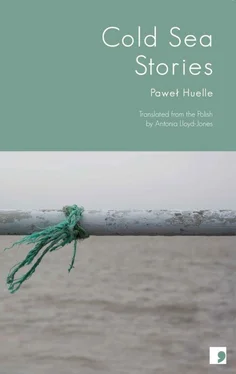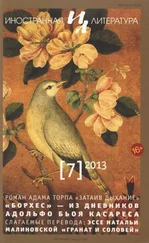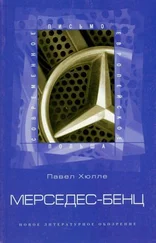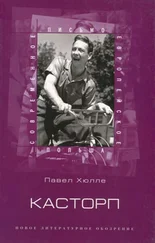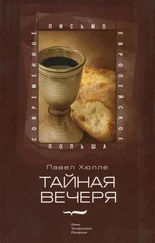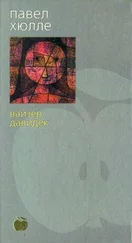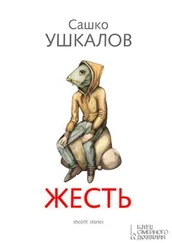Probably if he had written down the tales he invented, in a few years he would have had a complete set of short stories. With a brilliant title, let’s say The Secrets of the Cosmo Bar , it would have been a best-seller for at least a week. So Joachim was thinking to himself, as he descended into the subway one sunny November afternoon. He couldn’t forget what he had heard a few minutes earlier in the bar. An elderly fellow, a naval NCO, was relentlessly jawing away to his two mates about the insurgents from 120 years ago who still made appearances at his grandmother’s ranch. At night they stole cattle and horses, lit bonfires and fired their old popguns, but whenever the national guard were summoned, they never caught anyone. On the green line train Joachim considered several possible versions of this story, each one forking like the paths in a secret garden. But it wasn’t easy. Even the briefest description of the ghostly troop demanded knowledge that he didn’t possess. Who was their commander? Was it General Rojas, or someone else perhaps? Were they unionists or republicans? The history of the local dictatorships, coups, civil wars, crimes and sacrifices was like a sketchy diagram of a labyrinth he had never tried to enter. As he alighted at his station, he decided to get out the encyclopaedia and take a look on the internet, and even if making up this particular story proved too difficult, he would manage to stifle his evening depression. Lately it hadn’t given him a chance. He would wake up in an armchair when his half-drunk glass of whisky fell to the floor. He would switch off the television and drag himself to bed, upset by his own inertia. By life, which had long since lost its shine.
However, back at street level, as he was passing the Geological Museum, something happened that made him forget about all that in an instant.
At a crossroads, right on the corner, he noticed an old woman. Her ragged cotton dress, the man’s raincoat thrown over her shoulders and the knitted woollen hat were enough of a signal to avoid her. And yet he slowed down and stopped next to her small plastic bucket, as if to inspect her decaying sandals.
‘What have you got there?’ he asked, pointing at a small sheaf of plants tied together with string. ‘Where did you find that?’
As she only replied by smiling, he added: ‘So where does it grow?’
The old woman started talking in a dialect he couldn’t understand. Her face was furrowed with scars and betrayed native Indian descent. Her toothless mouth resembled a sponge.
He leaned over the bucket, took hold of a bunch of green foliage growing out of white roots, and slowly sliding his hand down the long leaves, put the unusual bouquet to his nose. He was not mistaken. It was Acorus calamus , simply known in his native tongue as tatarak – sweet flag. Never, not by any river, pond or lake, had he ever come across it in this country. He felt a strange charge, a tingling that ran the length of his body from head to toe.
‘Where does this grow?’ he repeated, reaching for his wallet. ‘Where did you pick it? On a ranch? At the botanical garden? It’s impossible! I know the botanical garden better than anyone!’
But none of his words were getting through to her. She was staring hard at his hand as it fished out a banknote. She accepted the lavish payment in silence, with a nod. She poured the rest of the water from the now empty bucket, and without a second glance at him, shakily waddled off along the pavement, with a newly lit cigarette in her mouth. That was when he noticed that her ancient sandals didn’t match.
II
He put the sweet flag in a vase, which Julia had bought long ago. This fake version of Greek antiquity had really annoyed him at the time: did the donkey Hephaestus was riding really have to have quite such an erect tail? And as for the Silenus following the divine smith, did he have to have an equally prominent appendage? And what was that sack he was carrying on his back? None of the familiar myths gave grounds for this particular artistic vision. And there was the colour scheme too – garish and tacky, like the covers of the magazines cooks and chauffeurs loved reading. Julia had laughed at his objections.
‘Have you got something against folk art?’ she had asked.
Now, after all these years alone, the sudden memory of her voice and her touch made him feel painful confusion.
‘My Silenus,’ Julia had whispered, ‘my lovely little donkey!’
That night of love had been accompanied by distant volleys of rifle fire, the rumble of artillery and the whistling of aeroplanes over the city. The coup by the latest junta did not have the slightest significance in their lives. They had never meddled in the local politics. Although naturalised, they were foreigners here. In the darkened room Joachim lay in bed, gazing at the vase with the bunch of sweet flag and wondering where Julia was now, if her body had long since turned to dust? Or to be precise, did some immaterial particle of Julia, which all the religions call the soul – did her personality still exist somewhere beyond the confines of the coffin lying under the ground at All Saints cemetery, where the damp, maggots and bacteria had done their work long ago? Joachim had no illusions: all the religions told bare-faced lies. Bare-faced, because no one had ever given a sign from the realm beyond. Flying saucers, just like Jesuit tales about spirits, were a consolation for the naïve. Julia’s present existence could only have two forms: a decomposing corpse in the coffin, or his personal memories, in which she appeared – as now – beautiful and alluring. And as she had no family, the moment when he himself would die would be her ultimate end: with no one left to remember her, she would finally sink into a black hole, non-existence, the abyss, like whirling specks of cosmic dust. And what would happen to him? He was not in the least concerned about the memories somebody might have kept about his life. He got out of bed, went into the kitchen, took a bottle of whisky from the cupboard, fetched some ice cubes from the fridge, went back into the bedroom with a full glass and switched on the television. In Saint Peter’s Square a mass was being said for the soul of the late Pope. A strong gust of wind turned a few pages of a Bible lying open on an ordinary, plain coffin. An emotive journalist announced that surely the Holy Spirit was manifesting His presence. Joachim sighed at this portent of a miracle, took a large swig, switched off the television and went to bed. But he didn’t fall asleep. The smell of the sweet flag was so strong and pungent that even the alcohol he had drunk could not dull the impression: he heard the clatter of oars being set in the rowlocks, the splash of a wave against the underside of the boat, the murmur of the wind in the reeds and the cry of the water fowl, among which he could unmistakably distinguish the sounds of the tern and the loon, and the long groaning of the bittern. He and his father were walking down the hill to the jetty. Around them there was a scent of the first hay harvest, mint and clover. Both of them were wearing their white, Sunday-best shirts, starched and ironed by his mother. Once they were aboard the flat-bottomed boat, his father took off his jacket, rolled up his shirt sleeves, straightened his bow tie, and as he took his first swing at the oars he said: ‘Now don’t forget, this is a serious business. Music is what our souls need the most. Do you understand?’
He didn’t entirely. But he was happy. Marta and Andrzej had stayed at home, with their mother, doing normal things. Meanwhile he and his father were cutting across a wide arm of the lake, as if united by an extraordinary secret. A large, dazzlingly white cloud hung motionless over the water, but it wasn’t obscuring the sun. It was reflected in the green water like the face of an ancient divinity.
Читать дальше
